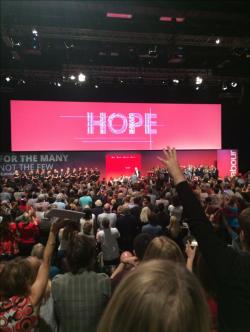The following editorial paper is published here as a discussion paper. Reader of Left Horizons can add their comments at the end of the article, or contact the editor directly on editor@left-horizons.co.uk
As the recent conference has shown, the Labour Party is at a crucial juncture in its development, with the right wing consolidating its hold at the top, but with a lively and radical rank and file, including a large, albeit disparate, left wing. There are many on the left, including genuine and honest socialist comrades, who have resigned their Labour Party membership and walked away. There are others who are on the cusp of walking out, but for the moment are hanging around to see what happens. For Marxists, therefore, it is probably a good time to re-appraise the Labour Party and re-examine its role in relation to the British working class.
The essential element in developing a correct political orientation is a sense of perspective: in which direction is society moving, nationally and internationally? What is the trajectory of the working class in particular, and how will the labour movement change? These are the things we need to examine.
Any discussion on perspectives needs a ‘health warning’, in the sense that we are living in a very volatile and turbulent political period. All kinds of unexpected and unprecedented events have occurred in the recent past and there is nothing to indicate that the future will be any different. But having given that proviso, it is important that, as far as possible, we take stock of where the labour movement is and where it is heading, and thereby orientate ourselves correctly within it.
Above all, we must base ourselves on the objective conditions and changes taking place within the working class and the labour movement, and not be gulled by the entirely false atmosphere that pervades so much of the social media ‘bubble’ within which we are all obliged to operate, at least to some extent.
Climate change will impact on politics world-wide
Although it is not within the scope of this discussion paper, broader developments – World perspectives as well as British – always need to be borne in mind. On the Left Horizons website we have dealt with the crisis of climate change and the way that it could come to impact on the day-to-day lives of workers around the world. In Britain, we may not be subject to forest fires of the kind that have devastated parts of the USA and elsewhere, but we do have floods and other natural catastrophes that undermine economic conditions and come with heavy costs.

Even today, supply chain problems are affecting the global economy and directly affecting the jobs and livelihoods of British workers. Across the globe, longer term, there is an increased likelihood of forced migrations as some regions become unable to sustain human life, and in the shorter term, climate change will undoubtedly have an impact on world food prices.
The world-wide Covid pandemic has not created any new fractures in society, but it has dramatically widened those that already existed, with the rich getting even more wealthy and the poor paying the price for lockdowns and economic collapse. The bills for the huge amounts spent by governments across the globe to deal with Covid will be presented to the working class for payment.
It has been working class people, retired and in key public services, who have borne the brunt of the fatalities in the pandemic. Low-paid workers, in insecure jobs, their lives permanently blighted by uncertainty and poverty, will be expected to dig deeper in the months and years ahead to pay for the privilege of being ‘key workers’, grafting the hardest during the health emergency, while being paid the worst.
Politics is increasingly volatile and unpredictable
Even before Covid, we had seen a growing and universal distrust of established politicians and parties and a feeling among workers of impotency in the face of powerful and out-of-touch international elites, like the EU Commission and the IMF. The opposition of workers to migrants has not been due to any innate racism or xenophobia, but has been a part of a mix of factors that has made workers feel alienated from those at the ‘top’ making all the decisions, while the lives of those at the ‘bottom’ are increasingly precarious and unstable. Politics is more volatile and unpredictable than ever and every single election, without exception anywhere in the world, is only won by the promise of ‘change’.
All these triggers are common international factors and they have led to the rise of nationalist ‘populist’ movements and big electoral swings in many countries, particularly in Europe and North America. The same turbulence in social and political consciousness is set to continue and, if anything, become more intense in coming years.
All of these changes have been manifested in the UK to one extent or another and the collapse of the Labour vote in Scotland and in some north of England constituencies, as well as the vote for Brexit are all, in different circumstances, indications of the new volatility.
Given with one hand and taken away with the other
In Britain, there is no possibility of the Tories ‘levelling up’ and, despite all the high-flown bluster from Johnson about doing away with the ‘low-wage’ economy, the Tories offer nothing but cuts in living standards. Public sector workers have had no real increase in wages for years and what is grudgingly given with one hand will be taken away with the other, through higher taxes and National Insurance, and by an inflationary erosion wages. Food, a more significant element in the family budget for lower-paid workers, has an inflation rate twice the ‘average’ rate.
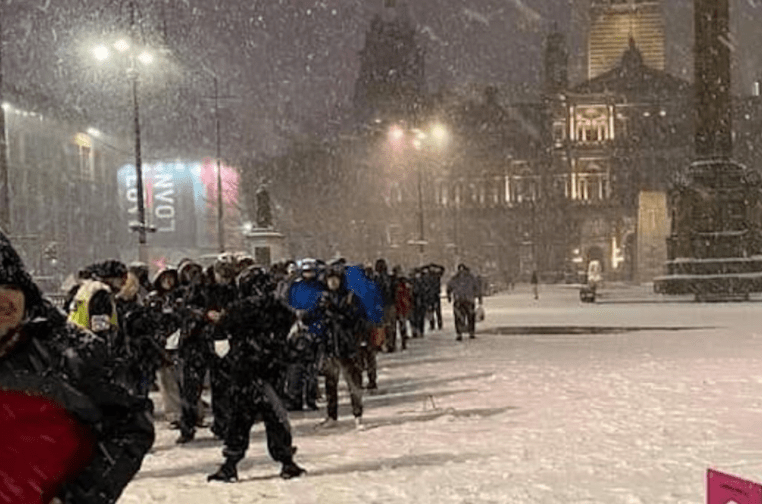
For the least well-off and workers on benefits, the removal of the Universal Credit uplift of £20 a week, is a devastating blow. Already, in the fourth or fifth richest state on the planet, one in three children is living in a household in poverty. In some towns the figure is astronomical: seaside towns like Blackpool, for example, have two thirds of children living in poverty. This coming winter, there will be more families than ever having to choose between heating and food.
We have to recognise that different layers of the working class face different circumstances at different stages of development. The most impoverished section, the lowest paid and the most precariously situated, comprises probably around 15-20% of the working class, but with a disproportionate number of younger workers who are on zero-hour contracts and who work in the gig-economy.
But this so-called ‘precariat’ is expanding year by year, and more workers, including some previously better paid, will feel the chill wind of the coming economic winter. Workers are facing a new epidemic of fire and rehire, as business tries to drive down wages. There is a trend towards an increase in trade union membership, sometimes in new unions, and following that, the trend will be towards a struggle to defend workers’ rights.
Is an orientation to the Labour Party justified?
This background is important, and we will come back to it, because without taking this into account, there can be no realistic discussion of what is likely to happen in the Labour and trade union movement. This is the context in which we have to consider what is going on in the Labour Party and whether or not it is justified in remaining in it and having an orientation towards it. Are we involved in just an “endless wait for a new left turn in the Labour Party” (as it has been described) or is our orientation still fundamentally correct?
In 1964, the Socialist Labour League, a quasi-Trotskyist sect, announced that Harold Wilson, the recently elected Labour Prime Minister, was “exposed” and should be forced to resign. Not long afterwards, this sect took its supporters out of the Labour Party. “Exposed” he may have been in the eyes of these ultra-lefts, but that did not prevent Wilson going on and winning more general elections, in 1966 and in 1974 (twice). The SLL, by the way, later became the WRP, producing a daily paper at one stage, (thanks to money from Libya’s Gadaffi) until today it has split into a myriad of sectlets.
The reason why that story is important is that there are many on the left today who are saying, in much the same words as the SLL over fifty years ago, that Keir Starmer has been “exposed”. He has introduced constitutional changes to strengthen the position of MPs in selecting the next leader; he has made de-selection of MPs more difficult and with his choice of general secretary, David Evans, he has introduced a completely undemocratic system of discipline, which, together with recent proscriptions, is aimed exclusively against the left. Not least, he has ignored the very radical resolutions passed overwhelmingly by Labour conference, to pin his political colours to the Blairite mast.
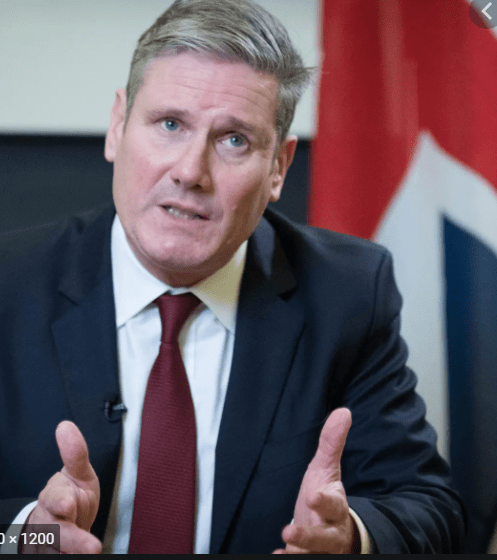
He is, therefore, according to some lefts, “exposed” for what he really is. But we need to have a sense of perspective here. What the right wing has done, in terms of constitutional and organisational change last month still leaves the Labour Party better than it was, say, thirty years ago, when no-one else but Labour MPs chose the leader and when deselection of Labour MPs was almost unheard of.
Open selection has been on and off for forty years
What was debated at conference in 2018 – ‘Open Selection’ (and only put aside because of the half-heartedness of the soft left around Corbyn) – was debated as a major issue forty years earlier. In the hothouse atmosphere of modern politics, there is no reason to think we will have to wait around another 40 years for it to come back again.
The main point is this: that although we cannot deny the fact that the right wing have consolidated themselves in organisational and in political terms, we should not make the fundamental mistake of the ultra-lefts in thinking that because they (and we) can ‘see through’ the Labour leadership, that all workers do. Keir Starmer may be ‘exposed’ in our political judgement, but that does not apply to the millions of workers who will vote Labour in the next election.
It is true that the shift of the Labour leadership to the right has resulted in many members resigning in disgust. Tens of thousands, some figures say as many as 150,000, have left. Many, but by no means all of these were activists. Indeed, of the hundreds of thousands of new members who joined to support Jeremy Corbyn between 2015 and 2017, the big majority of them were never active, even in the sense of attending meetings. They certainly helped the finances of the party, and their absence today has plunged the party into financial freefall.
Both ‘stories’ need to be told to give a balanced view
Many of those new members helped CLPs to achieve record attendances at meetings and there were large turnouts of election workers in the 2017 and 2019 general elections. But since then, the attendance at meetings dropped away again, and large numbers of dispirited members have drifted away, a process probably starting even before Starmer became leader.
In our editorial on the website, Two lessons from Labour conference (October 1), we argued that there were two stories to tell about Brighton, and two trends to identify. To see one without the other is to see a wholly unbalanced picture. The success of the right wing, we argued, “did little to dampen the political aspirations of the Labour and trade union rank and file, which is still firmly on the left”. That is still the position we hold, and it is a central element in the perspective we have for the Labour Party.
In our political material we have often raised the question of ‘Corbynism’. What did that movement represent? Why was it that hundreds of thousands of workers and youth joined the Labour Party, in three waves: in the leadership campaigns of 2015 and 2016, and again in the general election of 2017? How was it that Corbyn could overfill scores of mass rallies up and down the country? Why did thousands wait in the pouring rain on the banks of the Tyne to hear Corbyn speak at an open-air rally in Gateshead? It is completely contrary to the methods and principles of Marxism to suggest that this movement represented either personal support for Jeremy Corbyn, or that it was an historical ‘accident’.

For the movement to take the form it did, around the leadership campaign of Corbyn – that was a historical accident. But the fact that there was a movement at all was not due to accidental factors: it represented a shift in the consciousness of millions of workers, which at that time, and under those given circumstances, found an expression through his leadership campaign.
Corbyn was seen as embodying a different kind of politician
That shift in consciousness was not an ‘accident’ either; it arose from the squeeze in living standards – let us recall, the steepest fall in living standards since the Napoleonic Wars – and the growing insecurity the alienation of young workers. In an atmosphere of increasing distrust of established political leaders, Corbyn was seen as embodying a different kind of politician, someone who could really change things.
As we have implied above, the shift in consciousness that has taken place is not a simple process and neither will it be simple in the future. It was shot through with all kinds of currents and counter currents, mixing left ideas with right. A section of the working class has always voted Conservative and some of these workers were carried along by a largely anti-immigrant Brexit campaign in 2016.
The same workers were not in the least attracted by what they saw as the cosmopolitan, middle-class outfit around Corbyn, and they showed their displeasure again in the 2019 election. But without doubt, Corbyn’s presence on the leadership ballot in 2015 galvanized a wide layer of workers and especially young workers into supporting him. Even Corbyn’s presence on the ballot in the first place was due to the perception of the right wing of the Parliamentary Party, looking uneasily over their shoulders, that they had to be seen to have defeated the left (as they expected).
That victory for Corbyn came as such a shock to the right wing of the Party that as soon as they were able, they moved to stop such an event ever happening again, egged on, of course, by the capitalist media. That is the reason for the raising of the nominations threshold to 20% of Labour MPs and the (failed) attempt to go back to the electoral college system of leadership elections.
Corbyn victory was a shock to the right wing
Those who see the ‘Corbyn experience’ as a one-off historical event – “once in a lifetime” as one left wrote on Facebook – are therefore well wide of the mark. It is up to those comrades to explain, if Corbynism did not arise from a widespread but inchoate shift in the consciousness of workers, then how did it come about?
There are comrades in the movement who, like us, do accept that it was a shift in the consciousness of workers that led – momentarily – to a political breakthrough and a dangerous shock to the right wing and the ruling class. To those comrades we would pose the following question: if it can happen once, why can’t it happen again?
We would not suggest, of course, that another movement would be the same as the last. History never repeats itself. It would be likely to have a different form, with a different political figurehead, and around a different set of political circumstances. But those who suggest that the Labour members who ‘staying to fight’ in the Party are merely in an “endless wait for a new left turn” are demonstrating a profound misunderstanding of what Corbynism represented and a complete lack of perspective.
So where are we with the Labour Party now, and is the Labour Party likely to be returned to office in an election? First of all, we have to note that we have been here before. There have been bans and proscriptions many times in the past, notably in the 1960s and 1980s. There have been expulsions before. There have been right-wing leaders before, and right-wing Labour general secretaries. We must see the situation in perspective and in the unions and the Labour Party as a whole, the right wing is not as strong as it was historically, despite its victories in the recent conference.
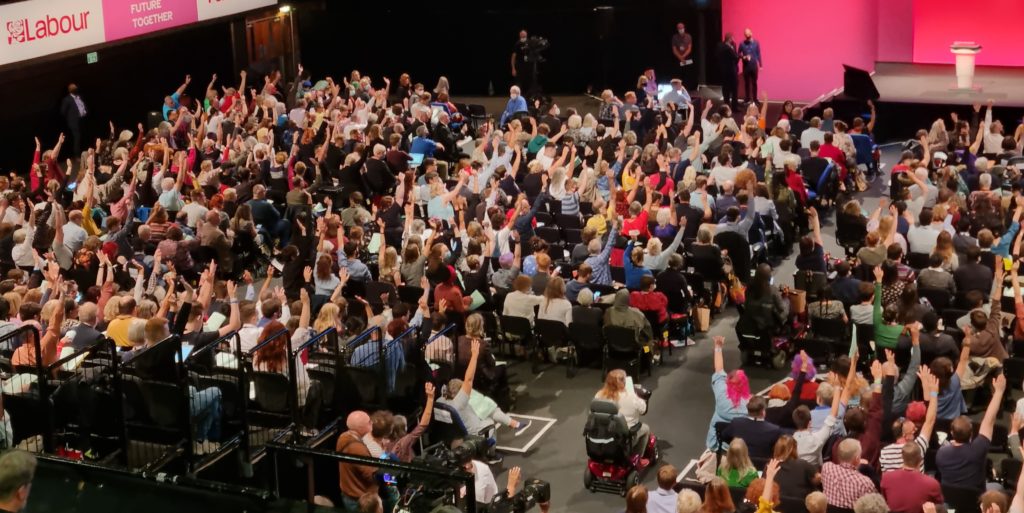
There is not the space here to list all the resolutions passed at Labour conference, but a glance through them shows the general temper of the delegations. On every important political issue, the conference resolutions passed were on the left. On the question of Israel/Palestine, for example, the resolution passed on a show of hands was a slap in the face for the right wing, who have consistently defended Israeli policy in the Occupied Territories or have kept silent over human rights abuses.
The resolution included the following: “Conference notes the TUC 2020 Congress motion describing such settlement building and annexation as ‘another significant step’ towards the UN Crime of Apartheid…Conference also notes the unequivocal 2021 reports by B’Tselem and Human Rights Watch that conclude unequivocally that Israel is practising the crime of apartheid as defined by the UN…Conference resolves to support “effective measures” including sanctions, as called for by Palestinian civil society…”
To give a flavour of the sentiment of some of the composite motions on domestic issues, this list below is taken from a variety of composites, exclusively from those moved or seconded by trade unions, most of which were passed overwhelmingly on a show of hands:
On public services [the Labour Party will]
- Fight for public services free from profit, funded through general taxation – with any increase falling on those with the broadest shoulders – and brought back – in house’.
- Build a campaign with trade unions, community and tenant organisations, service users and Labour councillors to fight for the funding necessary to not only stop, but reverse local government cuts.
- [introduce] legislation to bring about a universal, comprehensive and publicly provided NHS,
On NHS and social care, [a Labour government should]
- extend the insourcing of care services through public procurement, remove profit from our social care system,
- ensure care workers are paid at least in line with average wages (now £15 an hour), with clear routes for training and progression.
On industrial policy:
Conference believes to win again, Labour must be an anti-austerity party, defending jobs and improving living standards; and increases in public sector pay.
Conference reaffirms its support for an industrial strategy based on investment in infrastructure, including into a fully publicly owned railway, and a procurement strategy that supports green jobs across the UK, widening democratic public ownership of key areas,
Conference resolves to support
- working people in dispute fighting employers using ‘fire and rehire’ and similar mechanisms,
- to stand with those campaigning and fighting to improve their pay and conditions, supporting their demands and defending the right of all of us to resist attacks on our pay, terms and conditions and to protest.
- £15 per hour statutory minimum wage
- Increasing statutory sick pay to a living wage, to be paid from day one of absence; and for the lower earnings limit that means low paid workers are not entitled to SSP to be abolished
- ban zero-hours contracts
On climate change:
- Repealing all anti-trade union laws so workers can freely take industrial action over wider social and political issues, for industrial action to ensure action on climate change.
- Public ownership of energy including energy companies, creating an integrated, democratic system.
Of course these resolutions will not feature in any manifesto written or approved by Keir Starmer, but the point in listing them here is to illustrate that the rank and file of the party, including the ranks of the unions, are still well to the left of the leadership. Regarding the trade unions, the ranks are to the left of the leaders as well, some of whom, as we have pointed out, are playing a double game: articulating their members’ demands, while propping up a leader who they know will sell those members out.
In the unions, too, things will change. Indeed they are already changing. We should not forget that it was the trade union leaders, some of them warily looking over their shoulders at their members, who stopped Starmer’s plan to return to the electoral college system of electing the Labour leader.
During the reign of the right wing in the old EEPTU and AEU (both unions now part of Unite), the right was so dominant that officials actively policed the unions to purge lefts from conferences and committees. Being an active Marxist in those unions entailed an almost clandestine level of political organisation, such was the power of the union bureaucracy.
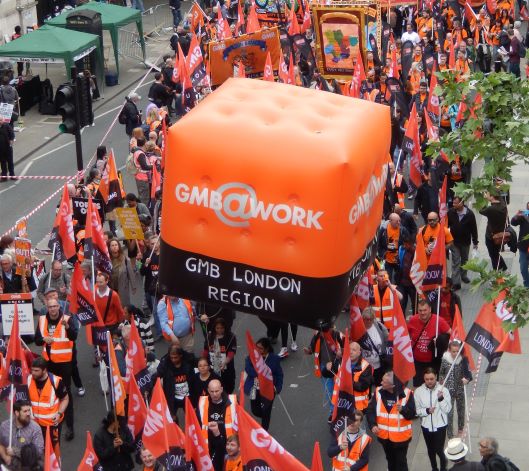
That barely applies in a single trade union today, and even the GMB doesn’t come close. More to the point, the dead hand of the bureaucracy in those days was still unable, despite its best efforts, to prevent militant shifts among the rank and file, shifts which were ultimately reflected in leadership elections.
Can Labour win the next general election?
Labour have won previous general elections, even in circumstances where the right wing controlled the Labour leadership and the NEC. Tony Blair did away with Clause IV of the Party rule book but was able to win the election in 1997, because the constitutional change passed most Labour voters by. The right wing have controlled the Parliamentary Labour Party, the party apparatus and the councillors as much (or more) in the past as they do today. Yet, despite this and not because of it, Labour won general elections, after periods of Tory government, in 1964, 1974 and in 1997.
There is no reason to think that Labour cannot win the next general election, despite Starmer. If that happens, Keir Starmer (or another right-winger in his place) will try as hard as they can to throw a wet blanket over the expectations of Labour voters. But in voting Labour, workers will not read the small print of the manifesto, and an incoming Labour government, would still carry the hopes and aspirations of millions for change.
Out of the ten or twelve million workers who will vote Labour in the next general election, 90 or 95 per cent will have no knowledge of and would not have followed the internal rows in the party and the constitutional changes. Even if some of them had, there could be such an overwhelming anger at the Tories that Labour could still be elected.
There is a sense in which this Tory government appears to be unravelling, with petrol queues, labour shortages in the food industry, predictions of gas shortages and an overarching threat of higher prices and a squeeze in living standards. The more bitter the experience of Tory government in the next two or three years, the more determined workers will be by the next election that there needs to be fundamental change. Under those circumstances, given the position that the Labour Party is in already, with a still active and vocal rank and file, there could be big movements in the party after an election, and particularly in the trade unions.
If we are facing another possible three years of Tory government, they will be years of social convulsions, industrial struggles, and civil disturbances. Apart from anything else, workers would be motivated to vote by sheer rage and an utter rejection of the Tories’ abysmal record in office.
Labour leadership clings tenaciously to the ‘market’ economy
It may even be the case that a section of the media and the ruling class, faced with an upsurge of anger, in the form of riots, demonstrations and industrial struggles, might plump for a right-wing Labour government to lance the boil. They would seek to use Labour’s right wing as a safe ‘second eleven’ to hold back the movement, and if that fails – as well it might, given the way the Labour leadership hangs on tenaciously to the ‘market’ economy – to demoralise the labour movement and pave the way for an even more right-wing government.

But on the other hand, under modern conditions, although the right wing are the puppets of capitalism, and they control the leadership, the Labour Party as a whole cannot be seen as a ‘reliable tool’ of the ruling class. What the right wing do not understand, and many on the left have not noticed, will nevertheless have been noted by some of the strategists of capitalism: that the left reformists and the trade unions will respond to and articulate the pressure of the mass of workers for genuine change. It will be a dilemma for the ruling class, but if the experience of the Tory government is so bad, Labour may still win an election, even without the support of the mainstream media.
In the recent general elections in Germany, the CDU vote collapsed to its lowest post-war. Yet the economic situation in Germany is far stronger than it is in the UK. In a situation in the UK where living standards are being smashed, and given the volatility of modern politics, it is possible that the Tories could face a similar collapse. We are in an era when political change will not be slow and gradual but may be sudden and dramatic.
What about a split in the Labour Party?
What about the possibility of a split in the Labour Party? There are some on the left – and they include some honest, genuine comrades – who have had an almost apocalyptic view of a coming split in the Labour Party, a split that has been ‘imminent’ for years. For them, as Ted Grant used to say, there is no political ‘weather’ and the barometer is set permanently at ‘storms’.
Splits have always been inherent in the Labour Party, because its lower levels rest on and feel the pressure of the working class, mainly through the trade unions, while at the same time the leadership and right-wing MPs respond to the pressures of capitalism. The grassroots of the party are a genuine voice of the working class, but the tops of the party are the political representatives of capitalism. These two opposing class forces mean there are more or less permanent stress fractures in the party, the significance of which ebb and flow with the sharpness of the class struggle.
Indeed, there have been many splits, even in recent history: apart from the SDP in the early 1980s, there has been a succession of right wingers who have felt the temperature too much to bear and have wandered off into the wilderness. Some good party members have broken away to the left. Although we disagree with their actions, we have seen the disaffiliation of the FBU and RMT, the wrong decisions taken for the best of reasons, and the later re-affiliation of the FBU. We now have the disaffiliation of the BFAWU, after more than a hundred years of affiliation.
Disgruntled unions should ramp up political intervention
We should be clear that we are opposed to the disaffiliation of trade unions. Rather than walk away, unions that are unhappy with the leadership (and we do not blame them for that) should put into place a political action plan to ramp up their active intervention in the party. They should recruit their stewards and branch officials into the party, hold political education schools and regular briefing sessions in all the regions, to plan the union’s intervention. Whilst paying the minimum affiliation fees, they should focus any additional financial support on those left MPs closest to their thinking. That would have been a far more effective policy for the BFAWU to have followed, rather than disaffiliation.

At the moment, despite the loss of members and the BFAWU, the current state of the Party does not point, in our opinion, to a decisive, one could say historic, split in the Labour Party in the immediate future. Small splits will probably continue, including individual MPs or small groups of MPs, or with other smaller trade unions. But a large-scale split, involving one or more of the very large, affiliated unions – UNISON, Unite, GMB and USDAW, or a sizeable number of Labour MPs is unlikely, in our opinion, before the next general election. Indeed, as a general election approaches, there will be calls – especially from right-wing trade union leaders – for ‘unity’ in the party to beat the Tories.
If there was to be such a major split, with the formation of a large and viable workers’ party to the left of the Labour Party, and including significant trade union involvement, we would have to immediately reassess everything we are doing. If, for example, a number of Unite-sponsored left MPs had the whip withdrawn or were expelled from the party – MPs like Zarah Sultana, for example – there would undoubtedly be a big reaction in that union. There would, no doubt, be a debate on disaffiliation, and if Unite, the second biggest trade union and the biggest financial backer of the party, were to split, it would be a game-changer. But we are not there at the moment.
The greatest historic split in the Labour Party was the formation of a National Government by Ramsay McDonald in 1931. The Labour right wing today are as just as capable of such a historic betrayal and split, in the event that a Labour government was faced with an insoluble economic crisis. That is a possible scenario that will be baked into the inevitable crisis faced by an incoming Labour government. But, again, we are not there at the moment.
Decades of Tory-lite policies and local mismanagement
We also need to make a comment, however brief, on the Labour Party in Scotland. It was as a result of years of Tory-lite policies and Labour decadence in the many Scottish local authorities they controlled that there was eventually a reaction against the party. When the SNP adopted a ‘radical’ veneer to attract working class voters, it was able to pick up hundreds of thousands, particularly among working class youth.
Workers everywhere are at the moment receptive to the idea that far-off and out-of-touch bureaucrats are the source of their problems. For the SNP, the answer was simple and effective: it was not the City of London, or the banks, or big business, but Westminster that was the cause of Scotland’s troubles.
The Labour Party in Scotland today is in a much weaker position in comparison to the party in England and Wales and it does not look able in the short time to recover the ground it lost under the baleful influence of the Blairites. But as Marxists, we would still base our political work on the organisations of the working class, principally the trade unions. In contrast to nationalism and separation, we would pose the need for a common struggle around the mutual interests of workers everywhere in Britain, and that means, in political terms, supporting the political expression of the unions in the form of the Labour Party.
Coming back to the Labour Party in general, those who are advocating leaving the party now, or who are in a half-way house ‘preparing’ to leave, are not likely to make much headway. It has been suggested that we could see the development of a ‘left’ organisation like Die Linke (Germany), Podemos (Spain), or La France Insoumise, Mélenchon’s party in France. But given the First Past The Post electoral system in the UK, this is not likely to happen, in our opinion. Besides, workers do not take kindly to small organisations when there are large ones (they believe) that can better represent their aspirations.
Against that, it is notable that workers in general, and young workers in particular, are less attached to the ‘traditional’ parties than they may have been in the past. Scotland and the 2019 general election demonstrate that. We will see. But until there are clear signs of a serious development to the left of the Labour Party, we are entitled to be sceptical.
Is there a viable left in the Labour Party?
The question has been asked whether or not there is a viable left in the Labour Party. If we asked ourselves that question, the answer would have to be in the affirmative, despite the gains of the right at conference.

If we take the Northern region as an example, the North of England Labour Left, NELL, is still operating at full throttle and it has active representatives in thirty-six constituencies. In many ways it is a model ‘broad left’, better even than Momentum, in the way it puts the greatest emphasis on political ideas and political discussion. It has circulated model resolutions across the region and there is no reason to think it will not continue. In probably most regions to one degree or another there are attempts to maintain an organised ‘broad left’ in the Party.
At the Labour conference, there was a notably good Tribune rally. In the past, the old Tribune newspaper could fill a large theatre at every conference. Neil Kinnock owed his Labour leadership to his rousing speeches and fund-raising efforts at these Tribune rallies. Although the newly revived Tribune had a smaller rally this year, of ‘only’ around two hundred and fifty, its regular columnists and spokespersons are more consistently left reformist and not as ‘flabby’ left as they were in the past.
At the packed Tribune fringe rally there was an overwhelming consensus among those present (and the speakers) that what needed was to ‘stay and fight’ in the Party. The new Tribune is not in our view Marxist: its writers and columnists are the furthest left of reformism. But it is supported by many sincere lefts and its new-found stridency resonates with a wide layer of Labour and trade union activists.
One of the best speakers at that fringe rally was Jess Barnard, the national chair of Young Labour. After the closure of the Labour Party Young Socialists, young Labour members did not have an organisation to call their own…until recently. Now Young Labour is developing fast, locally, regionally and nationally, and despite the best efforts of the Labour bureaucracy to hamper its freedoms and its ability to campaign independently, it is still growing and is overwhelmingly on the left of the party. It will become an important force in the party in the future.
Momentum, although it has never fully recovered from the damage done by the Lansman leadership, is still a large and viable force on the left of the Labour Party, along with smaller left groups of one sort or another.
Clear signs of upward pressure from trade union members
We cannot, of course, forget the all-important trade unions, which, going forward, are the key to the Labour Party. The organisation of the left leaves a lot to be desired in the unions and the election of left candidates in UNISON, for example, has been hampered by the ultra-lefts splitting the left vote. However, the victory of the left in the UNISON NEC elections is the music of the future in that union and in others. Unite has a new general secretary, nominally on the left, with a left NEC These two unions alone, provided they stay on the left, will shift the balance on Labour’s NEC.
There are even signs of upward pressure from the membership in right wing unions like the GMB. If that union is conducting a ‘campaign’ on £15 an hour, as it claimed at Labour conference, it is not because the union bureaucracy has had a sudden epiphany. It is entirely due to the pressure of the union membership.
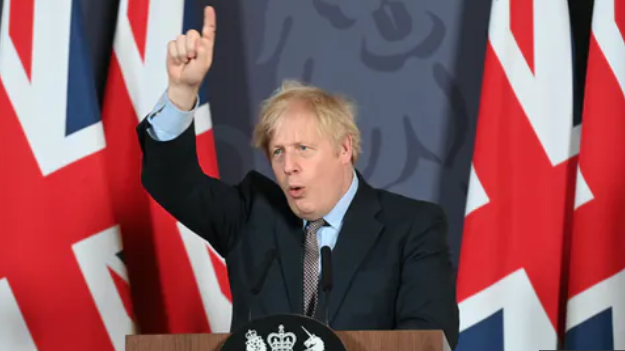
We have already reported on the radical nature of the resolutions overwhelmingly passed at Labour conference, for a £15 an hour minimum wage, on public ownership, against privatisation and out-sourcing, against zero-hours contracts and many others. This was despite the public ‘Blairite’ stance of the leadership. One would have to be blind to events not to see in these resolutions the pressure of the class through the CLPs and, especially through the trade unions. It is a pressure that is not going to abate in the coming months and years. On the contrary, it will grow.
Neither should we overlook the continued presence of a small minority of left MPs, who could catalyze opposition to the right wing. The Campaign Group is amorphous and flabby at one end, but it still contains several MPs who fiercely and relentlessly articulate the voice of workers, not least through social media. Any of these could provide a focal point for opposition to Starmer in the future.
Even without being an MP (yet), Andy Burnham is already seen as a leader in waiting, largely because he has articulated the interests of workers during the pandemic far better than Starmer did. Had Corbyn not managed to get on the leadership ballot in 2015, Burnham would have been the preferred candidate of the left (he was nominated by Unite) against others who were clearly right wingers, and had he been elected, he would have been seen by the left as far better than his predecessor, Ed Miliband.
In answer to question we posed, therefore, we would suggest that there still a strong and viable left in the Labour Party and one that shows little sign of shrinking. Nearly a fifth of the membership have walked away – overwhelmingly left-wingers – and had they not done that, and had they been organised, then the viability of the left would have been immeasurably stronger.
A right-wing Labour government could not satisfy workers’ needs
What, then, is the perspective for the Labour Party, bearing in mind the background we have already outline above, in terms of the social and economic factors that will come to bear? The historical weakness of British capitalism is such that there is no room for any serious reforms. Cosmetic ‘improvements’ here and there are one thing, and indeed maybe likely, but substantive changes that permanently improve the daily lives of workers would seem to be ruled out.
If there is a Labour victory at the next general election, it would usher in a government of crisis. Without room for meaningful reforms, a ‘new’ New Labour government would be forced, as was Syriza in Greece, to implement counter-reforms, leading to convulsions and upheavals in the party. As we have said, a new 1931-style split would be implicit in the crisis in the party.
On the other hand, if Labour were to lose the next general election, it would be the end of Starmer’s leadership, that is assuming he hasn’t been junked before then. The right wing have backed Starmer, and many party members voted for him, purely on the grounds that he was allegedly a ‘winner’ and that winning a Labour government – any Labour government – was better than a Tory government. A defeat could produce storms in the party every bit as much as those after the 2015 defeat.
The essence of a socialist revolution
The essence of a social revolution is the propulsion onto the political stage of millions of workers who were previously inert. The question is this: under present conditions, would that process occur, particularly in its earliest stages, without it having a dramatic and historic impact on the trade unions and the Labour Party? From where we stand today, the answer to that question must be a resounding ‘no’. It would in all probability affect these organisations and it would offer the potential for the development of a large Marxist tendency for the second time in recent history.

That is not to say that we should have a fetish about Labour Party meetings, many of which are dull and without real political debate or purpose. Many of the best left activists are not in the Labour Party, but involved in community groups, green movements and, not least, in trade union activity, and we should reach out to them wherever they are. There are many left groupings, notably groups like Momentum and NELL, that have a sort of ‘independent’ life alongside the Labour Party. We should participate in all such groupings. It is a matter of having a perspective and an orientation to the Party, not an obsession with official Labour meetings.
Neither should we minimise the difficulty for the left campaigning inside the Party. It is almost ‘open season’ on any prominent lefts today. It is not just individuals who are threatened by the Evans machine, of course, but organisations like Momentum, as well as whole Constituency Labour Parties and, who knows, perhaps entire regions in the future. But once again, it should be emphasised that the Marxists should have an orientation towards the party, and even after suspension or expulsion they should be fighting for reinstatement and for a return and an extension of democratic rights.
Millions of young workers who are not yet active
The forces for building a Marxist tendency and at a later stage a mass Marxist movement, will not come from a shuffling or a ‘reformation’ of the usual suspects, or the inhabitants of the left social media bubble. They will come from the millions of mostly younger workers, who are not yet active in any way, shape or form in the labour movement, and who may not even at this stage be members of a trade union. There are no signs at the moment of an influx into the Labour Party: far from it, the opposite process is taking place. But neither can it be argued that the 2015-17 insurgency of the youth, coming into the party in three great waves, could never be repeated.
We are not afraid of political debate and discussion with workers and youth who are new to politics and who bring into the movement all kinds of wrong-headed ideas, inexperience and even prejudices. That is a lot harder than discussion with like-minded keyboard activists on Facebook, but it is ultimately far more rewarding. While Marxists dive head first into the maelstrom of the workers’ movement, sectarians stands on the side, fearful of getting their principles wet.
Constant assessment and re-assessment of perspectives
We cannot base ourselves on the shrill denunciations of Starmer that litter the pages of the Facebook left. We must rest on what we understand of the objective social and economic conditions, on the real temper of the working class and how that impacts on the organised labour movement.
This is an article offered for discussion. There are no all-seeing oracles, and anyone can be wrong, on big or little issues. We have to constantly discuss perspectives, to assess and reassess where we are, honestly and soberly. If we are wrong on this or that issue, we must honestly acknowledge it and correct the mistake.
We have to patiently explain to those we can reach in the movement, with facts, figures and arguments. Where there is confusion, hesitancy and doubt, in the struggle for socialist ideas, we must seek to inject firmness, resolve and clarity. On the basis of Marxist ideas and ideas alone we will sink roots into all parts of the workers’ movement.
To those youth and workers we can reach, we should challenge them, in a comradely manner, to actively organise with the left of the labour movement. There is no justification for staying in the Labour Party except to organise against the right. But more than that, we should urge them to join with Left Horizons as a Marxist tendency in the workers’ movement. Marxism can provide the steel backbone that is lacking in an amorphous left. We should say to those activists, ‘Starmer might won the leadership, for now. But the class war is not decided by one skirmish. Join with Left Horizons to continue the fight, with energy, clarity of purpose and determination!’

